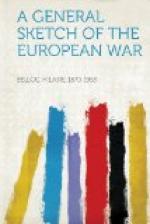THE SPIRITS IN CONFLICT.
At this point it is well to pause and consider an element of the vastest consequence to the whole conduct of these great campaigns—I mean the element of German confidence.
Here we have a nation which has received within a fortnight of its initial large operations, within the first five weeks of a war which it had proudly imposed upon its enemies, the news of a victory more startlingly triumphant than its most extreme expectation of success had yet imagined possible.
Let the reader put himself into the position of a German subject in his own station of life, a town dweller, informed as is the English reader by a daily press, which has come to be his sole source of opinion, enjoying or suffering that almost physical self-satisfaction and trust in the future which is, unfortunately, not peculiar to the North German, but common in varying degree to a whole school of morals to-day. Let him remember that this man has been specially tutored and coached into a complete faith in the superiority of himself and his kind over the rest of the human race, and this in a degree superior even to that in which other nations, including our own, have indulged after periods of expanding wealth and population.
Let the reader further remember that in this the Germans’ rooted faith their army was for them at once its cause and its expression; then only can he conceive what attitude the mind of such men would assume upon the news from East and from West during those days—the news of the avalanche in France and the news of Tannenberg. It would seem to the crowd in Berlin during the great festival which marked the time that they were indeed a part of something not only necessarily invincible, but of a different kind in military superiority from other men.
These, from what would seem every quarter of the globe, had been gathered to oppose him, merely because the German had challenged his two principal enemies. Though yet far from being imperilled by so universal a movement, he crushes it utterly, and in a less time than it takes for a great nation to realize that it is under arms, he is overwhelmed by the news not of his enemy’s defeat, but rather of his annihilation. Miles of captured guns and hour upon hour of marching columns of prisoners are the visible effect of his triumph and the confirmation of it; and he hears, after the awful noise of his victories, a sort of silence throughout the world—a silence of awe and dread, which proclaims him master. It is the anniversary of Sedan.




